Library
All resources
1861 – 1880 of 2421 results

USAID Procurement Executive’s Bulletin 2014-06
Policy paper
This Bulletin applies to USAID’s Acquisition Workforce consisting of Contracting Officers (COs), Agreement Officers (AOs), Negotiators, CO/AO Representatives (CORs/AORs), and Activity Managers worldwide. The purpose of this bulletin is to provide guidance to the Acquisition Workforce on promoting...

Annex B: Lebanon Case Study
Report
Cash and vouchers are increasingly provided as assistance to people affected by disaster and crisis. Studies and evaluations have firmly established that cash transfers can be an appropriate alternative or complement to in-kind assistance. Whilst some evidence exists on the Value for Money (VfM) of...

Mobile Cash Transfers for Urban Refugees in Niamey, Niger
Report
This study compared the effectiveness of cash transfers delivered through mobile phone and microfinance institutions to urban refugees in Niamey. The study found that the mobile phone delivery mechanism could be more cost-efficient than the MFI mechanism, after initial set up costs associated to...

Evidence of impact of emergency cash transfers on gender and protection
Report
This rapid review gathers together reports which provide evidence on the gendered and protection impacts of cash transfers (CTs) in emergency and humanitarian contexts. It aims to provide a guide to the level and type of evidence which is available, as much of the work written on this topic relies on...
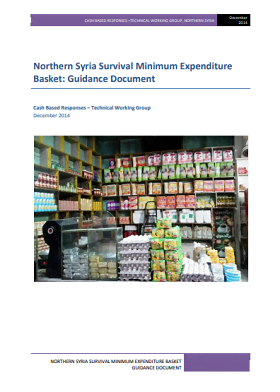
Northern Syria Survival Minimum Expenditure Basket: Guidance Document
Report
The Survival Minimum Expenditure Basket (SMEB) outlines the minimum culturally-adjusted items for survival for a household in Syria for one month. The basket comprises the basic energy requirements of 2,100 kilocalories per person per day, fuel for cooking, and non-food items. The attached guide has been...
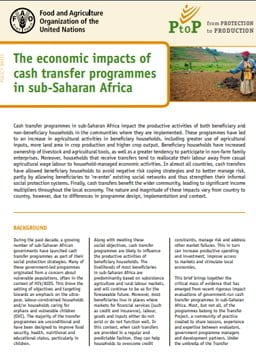
The Economic Impacts of Cash Transfer Programmes in Sub-Saharan Africa
Report
This brief brings together the critical mass of evidence that has emerged from recent rigorous impact evaluations of government-run cash transfer programmes in sub-Saharan Africa. Most, but not all, of the programmes belong to the Transfer Project, a community of practice created to share lessons,...
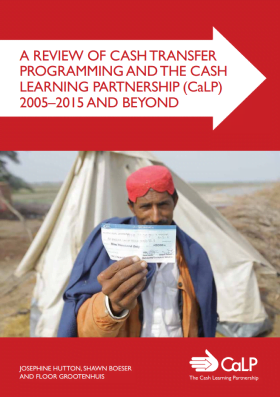
A Review of Cash Transfer Programming and the the CALP Network 2005–2015 and Beyond
Report
The core purpose of this review, commissioned by the CALP Network, is to evaluate the CALP Network’s progress since inception and examine the status and continued needs of cash programming in emergencies. Cash transfer programming (CTP) represents a significant shift in the way humanitarian aid can...
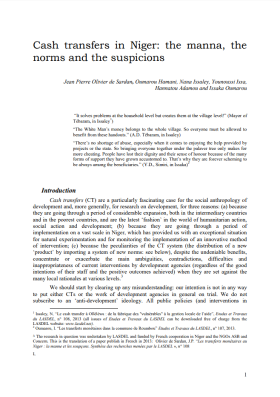
Cash transfers in Niger: The manna, the norms and the suspicions
Report
Cash transfers (CT) are a particularly fascinating case for the social anthropology of development and, more generally, for research on development, for three reasons: (a) because they are going through a period of considerable expansion, both in the intermediary countries and in the poorest countries,...

Lesotho Child Grants Programme – The historic and future costs of the CGP and its affordability
Report
The purpose of this costing study is to review the historical costs of the Child Grants Programme (CGP) between October 2007 and December 2012, simulate the likely future cost of the programme, and assess the programme’s affordability under the current fiscal environment. This report presents the...
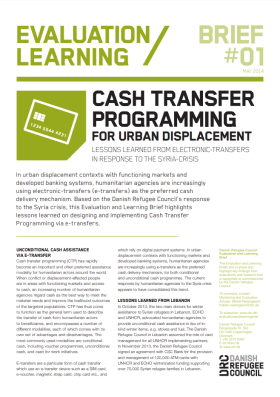
Cash Transfer Programming for Urban Displacement
Policy paper
In urban displacement contexts with functioning markets and developed banking systems, humanitarian agencies are increasingly using electronic-transfers (e-transfers) as the preferred cash delivery mechanism. Based on the Danish Refugee Council’s response to the Syria crisis, this Evaluation and...
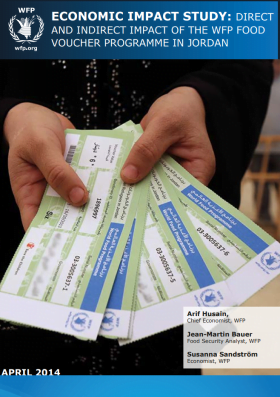
Economic Impact Study: Direct and indirect impact of the WFP food voucher programme in Jordan
Report
The intent of this study is to estimate the economic benefits of the food voucher programme implemented by the World Food Programmeme (WFP) for Syrian refugees in Jordan. The study employs a two pronged approach whereby the first component provides an analysis of the supermarkets that participate in...

Rapid Assessment for Markets (RAM) – Guidelines for an initial emergency market assessment
Guidelines and Tools
In today’s world, people’s livelihoods depend to a significant extent on markets. Sudden shocks can severely limit how markets function and, as a result, drastically reduce people’s access to essential commodities. This International Red Cross and Red Crescent Movement publication is designed to...
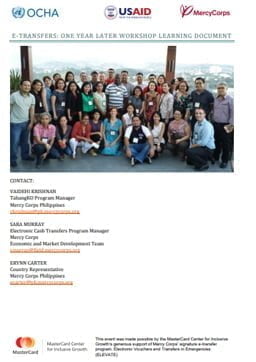
E-Transfers: One Year Later Workshop Learning Document
Report
In the aftermath of Typhoon Haiyan (known locally as Typhoon Yolanda), an estimated half million storm-affected Filipinos received an electronic cash transfer (e-transfer) to help them rebuild and recover from the storm’s devastation. The presence of a large number of Financial Service Providers...
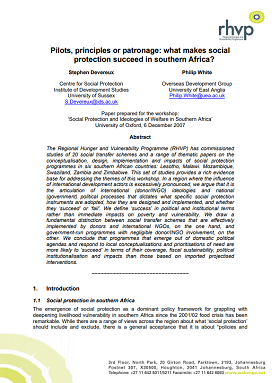
Pilots, principles or patronage: what makes social protection succeed in southern Africa?
Report
The Regional Hunger and Vulnerability Programme (RHVP) has commissioned studies of 20 social transfer schemes and a range of thematic papers on the conceptualisation, design, implementation and impacts of social protection programmes in six southern African countries: Lesotho, Malawi....

Using Ona and Open Data Kit to Build Mobile-based EMMA Market Assessment Questionnaires
Report
Purpose of this document
• To build a mobile data collection system to improve the speed and quality of market assessment data collection and analysis.
• To provide field assessment teams with ready-to-use guidance on developing and/or adapting market questionnaires without the need for in-person...

Market Analysis Guidance (MAG)
Report
The Market Analysis Guidance (MAG) suggests processes and tools aimed at integrating market analysis into the different phases of the project cycle, taking the existing Red Cross and Red Crescent (RC/RC) Movement’s technical documents into account whenever possible. The MAG was commissioned and...
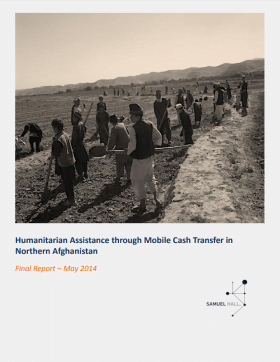
Humanitarian Assistance through Mobile Cash Transfer in Northern Afghanistan: An evaluation of a DFID pilot project in Faryab, Jawzjan, and Samangan
Report
In response to the 2011 severe drought that pushed vulnerable rural households into food insecurity in 14 provinces of Northern Afghanistan, DFID has committed to address emergency needs in northern Afghanistan with nutrition, food security and farming inputs. Samuel Hall Consulting, a Kabul-based...
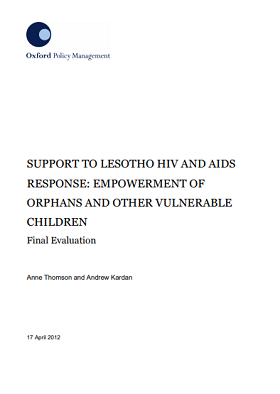
Support to Lesotho HIV and AIDs Response: Empowerment of Orphans and Other Vulnerable Children
Report
Oxford Policy Management (OPM) has been contracted by UNICEF Lesotho to undertake the final evaluation of the Project “Support to Lesotho HIV and AIDS Response: Empowerment of Orphans and Vulnerable Children”. The main objective of this evaluation is to provide decision makers in the Government of...
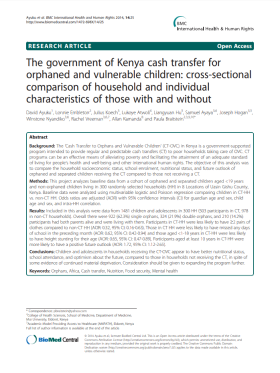
The Government of Kenya Cash Transfer for Orphaned and Vulnerable Children: Cross-sectional Comparison of Household and Individual Characteristics of Those With and Without
Report
The ‘Cash Transfer to Orphans and Vulnerable Children’ (CT-OVC) in Kenya is a government-supported program intended to provide regular and predictable cash transfers (CT) to poor households taking care of OVC. CT programs can be an effective means of alleviating poverty and facilitating the attainment...
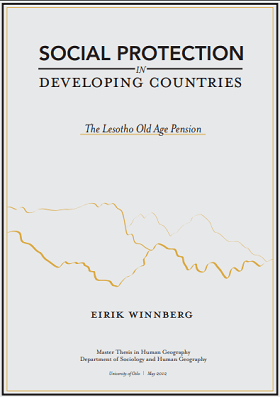
Social protection in developing countries – The Lesotho Old Age Pension (MSc Thesis)
Report
By using the example of the noncontributory pension scheme in Lesotho, the author explores the process of implementing social protection in developing countries, looking at how constraints can be overcome and what consequences can be found. This paper also looks at the justification for directing such...